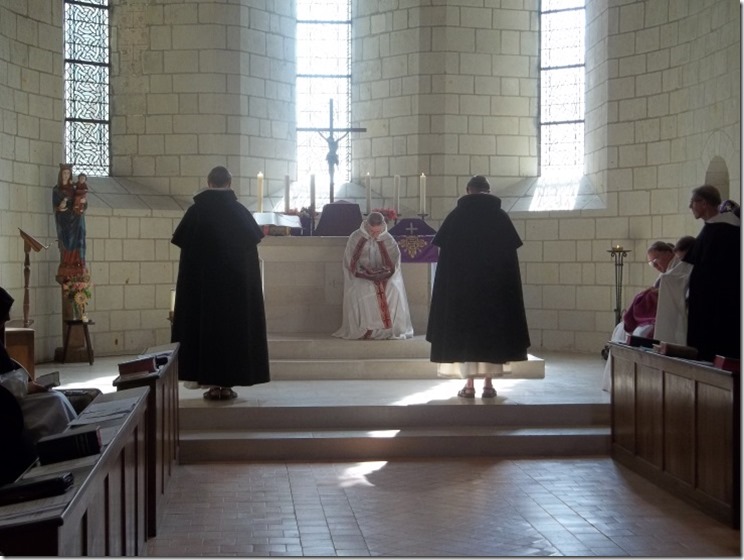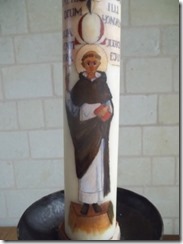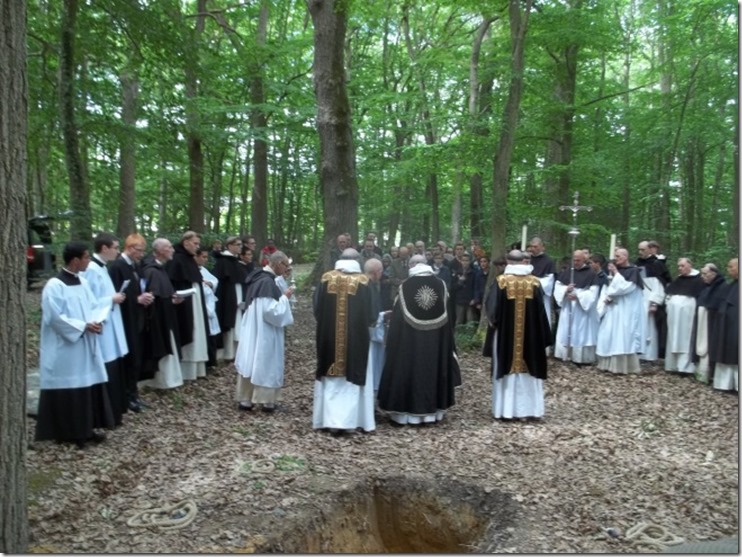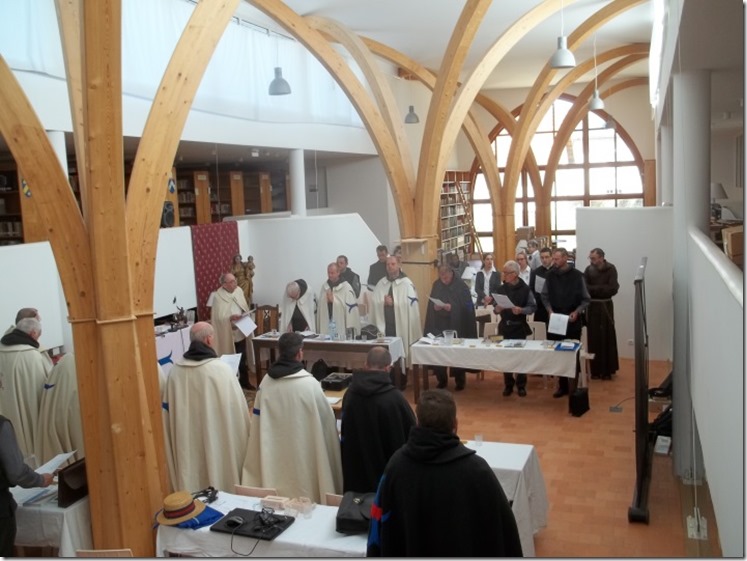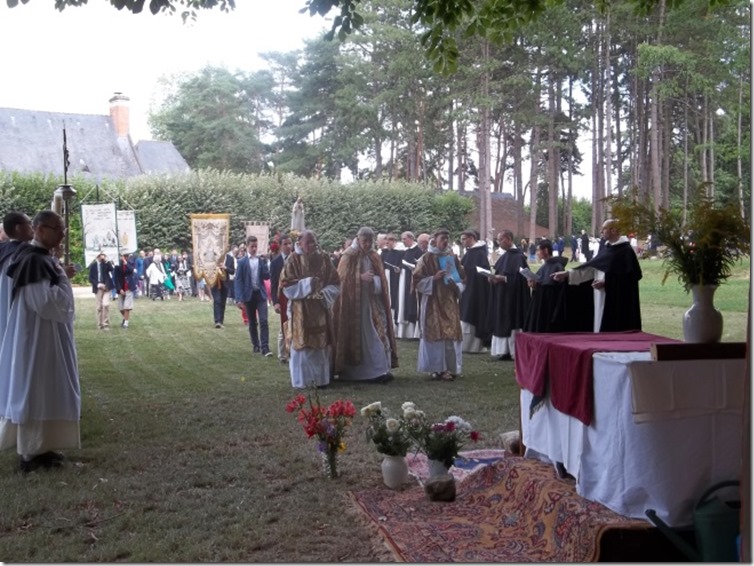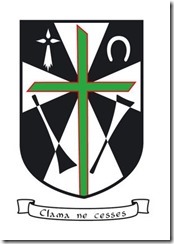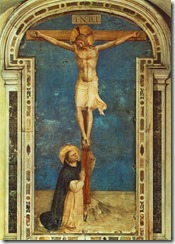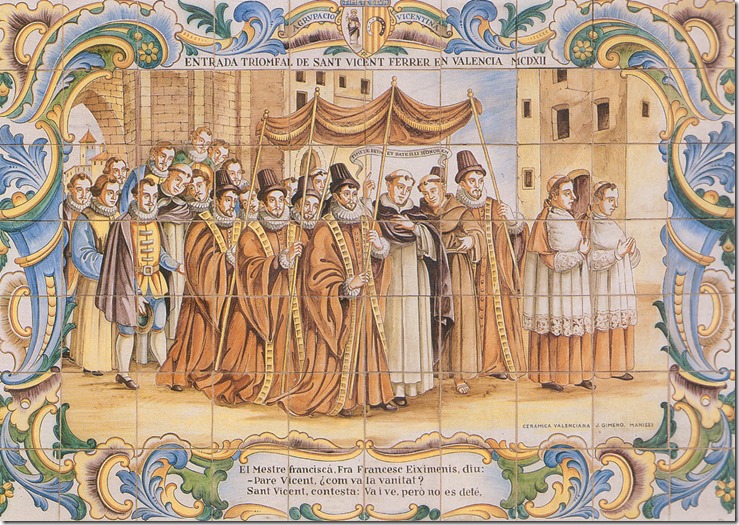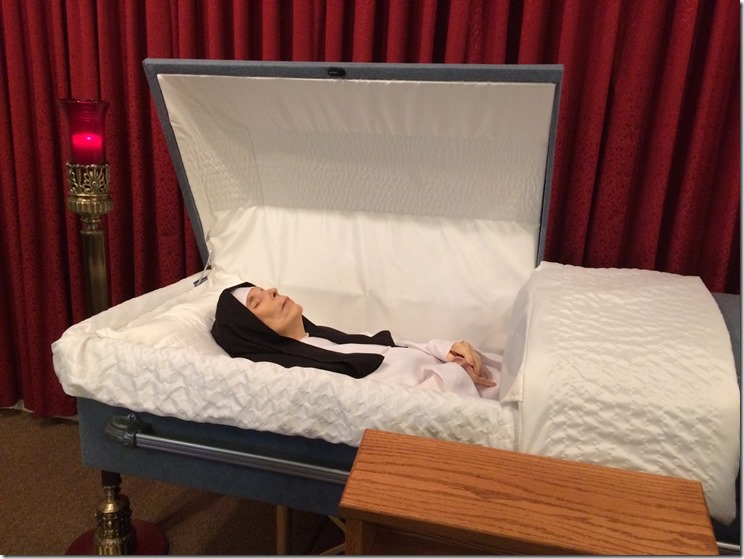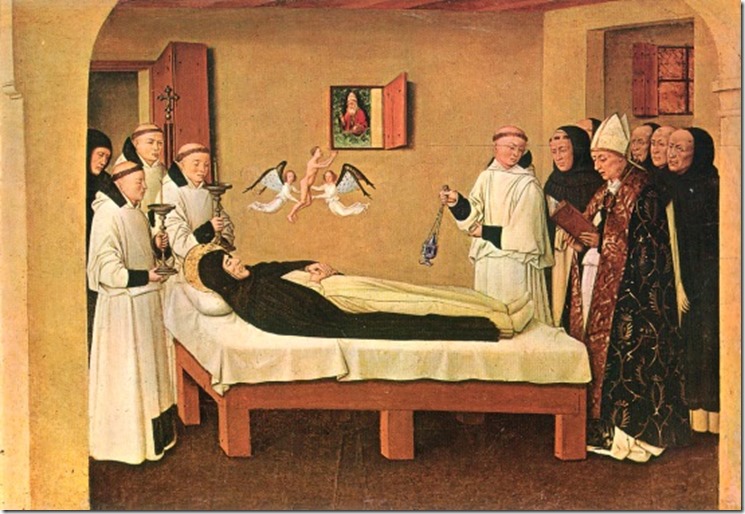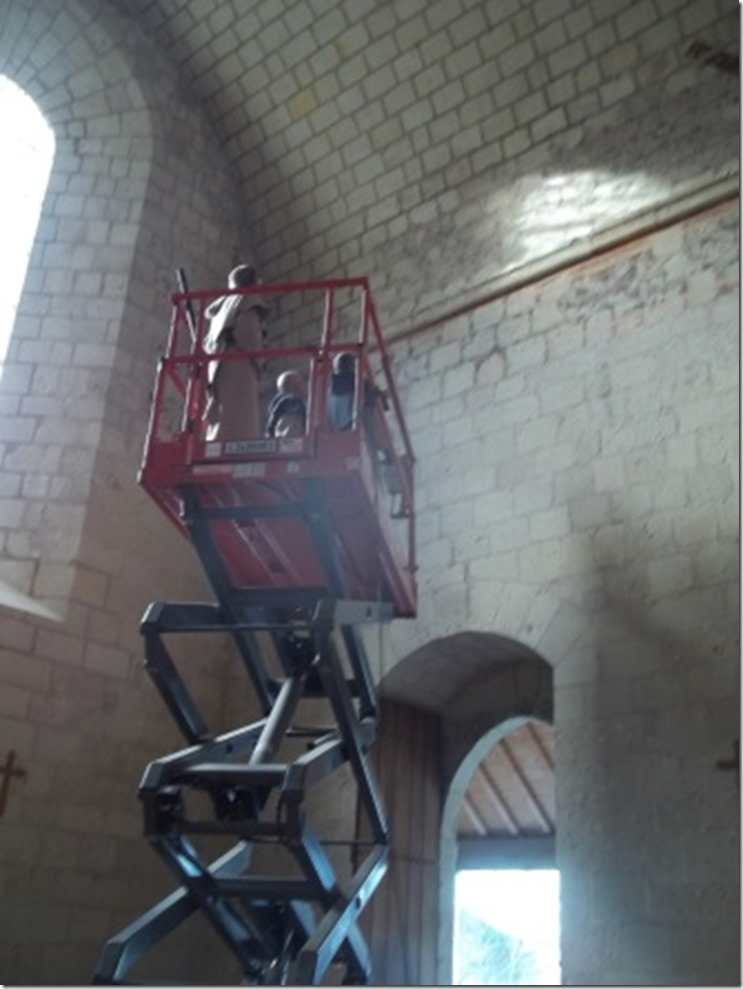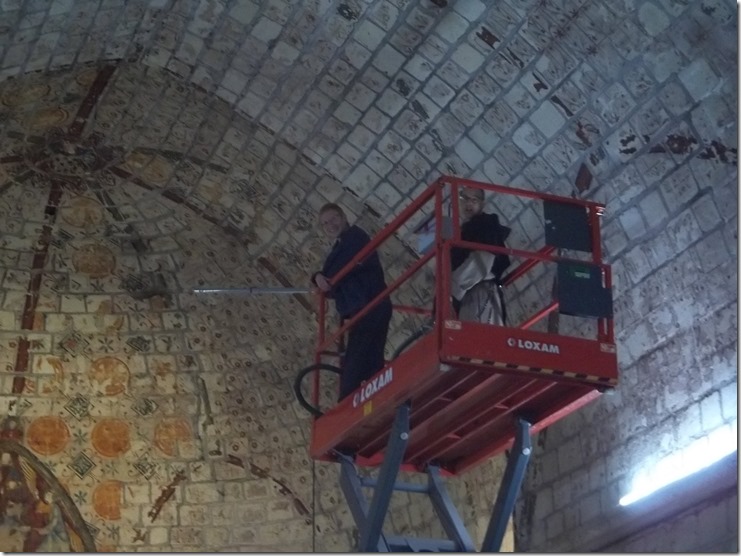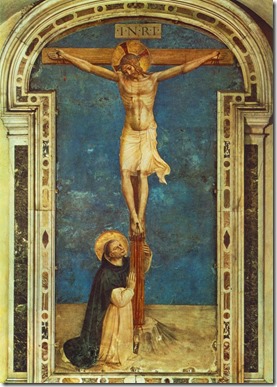A Model Catholic Wife and Mother:
Anna-Maria Taïgi (1769-1837)
By Dom Bernard Maréchaux, O.S.B.
Published in Le Sel de la terre 62, Autumn 2007
Anne Marie Taigi is known above all for the mysterious sun by which God gave her to see contemporary events, especially freemasonic intrigues. In a Rome victimized by subversion, she would warn the pope (for example, when the Carbonari 1 wanted to assassinate him) or particular cardinals that they should avoid this or that visit or outing. Consulted by Msgr. Natali concerning the audiences that Leo XII (1823-1829) was to grant, she would respond with confidence: “You may receive such a one; but stay away from this other; and be on guard about this one,” etc. Miraculously instructed concerning the dangers that were threatening the Church, she gave valuable counsels to Gregory XVI (who condemned the first manifestation of “liberal Catholicism.”)
But the marvelous must not hide the most important: it is particularly through her conversion and life as a wife and mother of a family that Our Lord has established Anna-Maria Taigi as a model for others. (“I have destined you to be known to the entire world as an example of penance and as the model for married women.”) We will thus accord particular attention to these two features of Anna-Maria in the essay which follows 2.
All those who must speak about God to their children or neighbors can ask Anna Maria Taïgi for this grace, because her husband described her talent as follows: “She spoke of God without becoming wearisome.”
Birth and Early Life
Anna Maria was born in Siena (which is in the region of Tuscany, Italy) on May 29, 1769. She was baptized the very next day with the names Anna-Maria Antonia Gesualda. Her father, Luigi Giannetti Masi, was a pharmacist. He fell into complete financial ruin when Anna-Maria was only six years old, and so relocated his family to Rome, where he and his wife were taken on as domestic servants in well-to-do homes. Their journey (on foot) advanced very slowly, and it was thus that Anna-Maria found herself from early childhood carried along by what a poet might call “the sorrowful wind of poverty (il vento doloroso delle poverta)”
Born in Siena, Anna-Maria Taïgi can be associated with the group of Siena mystics, especially the virgin St. Catherine. She is not unworthy to be compared with the saint by the greatness of her sanctity, the heroism of her martyrdom of love, by the supernatural gifts with which she was clothed, or by her role as a victim and mediator before the Roman Court and sovereign pontiffs in Rome where she lived and died, as did St. Catherine. The same Siennese blood, renamed by its sweetness “sangue dolce” (the expression of St. Catherine) coursed in both women’s veins; the same impassioned love of Christ embraced the hearts of the virgin and this humble woman.
The parents of Anna-Maria were Catholics. Once arrived in Rome, they placed their child with religious sisters, who prepared her for her first Holy Communion and Confirmation, and then had her apprenticed with honest women to learn domestic tasks. She then became a housemaid where she was exposed to the greatest of worldly dangers, but God protected her naiveté. Her intelligence and vivacity were hardly ordinary, and vanity and love of adornments occupied the thoughts of her young head. She did not have bad intentions, but who knows where this dangerous path might have led?
But Domenico Taigi, a domestic at the princely home of the Chigis, asked her hand in marriage – and she agreed. He was a man without much refinement, but an honest and a serious Catholic. Anna-Maria was 21 years old when the two were married.
Conversion
After her marriage, Anna-Maria continued for a little while with her life of entertainments and worldliness. This was pleasing to her husband who was proud of his young, elegant and well placed wife, but displeasing to God who put an inexpressible disquiet in her soul even though she did not deviate from her duties. Our Lord had designs of lofty and eternal mercy on Anna-Maria, and so on the designated day, the divine hunter of souls captured her in His net with a beautiful blend of authority and extreme sweetness.
The following is an account of Anna-Maria’s conversion as stated in the official proceedings of her beatification:
Anna-Maria went to Saint Peter’s in worldly attire. A Servite religious, Father Angelo (Verandi), upon meeting her, heard a heavenly voice: “Take good notice of this woman. I will confide her to your care, and you will work for her transformation. She will sanctify herself, for I have chosen her to become a saint.” In effect, Anna-Maria, not able to resist the disquiet in her heart, had resolved to go to confession and change her life.
She entered Saint Peter’s and drawing near to a confessional said to the confessor who was in it, “Behold at your feet a poor sinner.” The confessor dismissed her with harshness saying “Go! You are not my penitent.” This response discouraged the poor woman and she made an incomplete confession. Although she left troubled, she made the resolution to entirely renounce for God all her vanities and the resulting offenses.
But she wanted to have recourse to the Sacrament of Penance again, and so this time she went to church of St. Marcellus. Upon entering, she saw a priest in the confessional and without knowing who he was, she took her place in the confession line. It was again Father Angelo, and he recognized her. When it was her turn in the confessional he said to her with graciousness, “You have finally fallen into my hands.” He told her of the words that he had heard in Saint Peter’s, and encouraged her with a great charity and evangelical sweetness to make a full conversion.
Anna-Maria did not hesitate henceforward to give herself totally to God; with the consent of her husband, she divested herself of all her worldly attire and clothed herself in a simple, coarse dress. She embraced with ardor the most extraordinary penances, such that her confessor had to moderate what she was doing. She wept torrents of tears over her faults; hair shirts, disciplines, fasting and other mortification became her delight. So as to create a barrier between herself and the world she asked her husband for permission to wear the habit of the Third Order of the Most Holy Trinity. Domenico agreed 3, but on the condition that she not neglect any of her duties as a wife and mother; and in fact she did remain wholly faithful.
So now we have seen the account of our Blessed’s conversion. At this point there is an observation that we believe to be well founded: the crisis of vanity is crucial for women. At a decisive moment, every woman must answer the question whether to choose the world with its vain “joys,” or Jesus crucified with the renouncements that this entails. If, at the feet of her crucifix, she sacrifices her taste for vain adornments, she will walk with great strides along the Christian path, even to the highest summits. If, however, she imagines an impossible union between God and the world, she will be restless in her conscience, peace will elude her, the Sacraments will lose their savor, she will be exposed to illusion and sin, and even her salvation in peril.
Anna-Maria gave herself to God with a complete generosity, trampling on the vain attractions of this world. From the very start, she rivaled the most experienced of saints.
Thirst for Penance
The thirst for penance of this humble woman was insatiable. She pursued it in everything, allowing nature no comfort or respite.
The instruments of penance that were used in cloisters were familiar to her, but she subordinated their use to the judgments of her confessor – upon whom she depended in all things, knowing that nothing has value in the spiritual life except through obedience.
But a mortified soul is able to mortify itself in everything it does. Serving at table for her husband and children, Anna-Maria reserved for herself the scraps – and even food that was spoiled. When the weather was very hot, she drank very little or not at all. (And to endure the torment of thirst in Rome is a penance worse than the pain of hair shirts or iron chains!) Sometimes one of her children would notice that her lips were not wet on her glass, and would cry out: “Papa, mama is not drinking!” And then at the directive from her husband, Anna-Maria would drink a little bit.
She arranged things so that she could undertake what can be called the “Roman devotions.” This was not only the Scala Sancta (quite well known to Roman pilgrims) where she climbed these special steps on her knees, but also the great stone staircase of the Ara-Coeli. Anna-Maria would visit the various crucifixes that were venerated in the churches of Rome, notably that which was in St. Paul Outside the Walls. She made the tour of “Seven Basilicas,” which was a long journey under a hot sun and a midst waves of dust. Upon entering the doors of St. Paul’s, she would remove her shoes and not put them back on until she returned into the city. The way of the cross at the Coliseum was also quite familiar to her. Those who have undertaken such penitential practices will appreciate these heroic mortifications of the servant of God.
All of these devotions were only a portion of the penances that she undertook. Can you see her with her face prostrate and touching the ground, shedding tears and sobbing? Anna-Maria thus lamented her sins. See how she afflicted herself! She would strike her head and face on the ground to the point of bleeding from her mouth. This is similar to what St. Francis of Rome would do: for an idle word she would strike her mouth with blows of her fist until blood flowed. Such penances were forbidden to Anna-Maria, but what a penitential spirit did she not manifest as she chastised herself in so many ways!
The saints display a strong realization of the magnitude of sin. Is it the same with us?
Mother of a Family
It is important to recognize that the foundation of Anna-Maria’s great sanctity was her constant and unceasing carrying out of her daily duties as wife and mother, all elevated by her great love of God.
Concerning all this, we have the testimony of her husband Domenico Taigi from her process of beatification. A good Catholic, and a man of duty, Domenico knew nothing of mystical states. While Anna-Maria was often carried away in ecstasies (in spite of herself) by the strong power of the Spirit of Our Lord, Domenico thought that she suffered from some kind of sleeping sickness. Later, of course, he recognized such things as actions of God.
He was, moreover, aware of the great virtue of his wife and presented a testimony that reveals a profound emotion. He knew that she was very humble, sweet and patient; that she displayed a true spirit of religion, a great modesty in her conduct, and such wisdom and mastery of herself such that he could not but admire her without reserve.
Anna-Maria had seven children, four boys and three girls: Camillo, Alessandro, Luigi, Pietro, Aria, Sofia and Margharita. Three died at a young age. Only two daughters outlived their mother: Maria who never married and Sofia who became a widow with six children. Camillo had died at 42 years of age, and Alessandro at 35.
Domenico related that his saintly wife suspended her mortifications during all of her pregnancies, and took every precaution required of human prudence. She nursed all of her children and said that she could not understand how any mother could be indifferent to this duty. She formed her children in the ways of prayer; she taught them the first elements of religion.
She watched over the modesty of her little children with an extreme attention. Not only did the children have separate beds, but the beds all had curtains.
She never failed in her duty to correct her children, and she would not endure any fits of passion. She did not allow her children to be hit upon the head.
She neglected nothing so that her beloved little ones would have a solid religious instruction; she saw to it that her young daughters received Holy Communion every week, and her sons three times per month. These were the maximums allowed during the time period when Anna-Maria lived.
We also see that on one occasion Anna-Maria imposed a fast upon one of her not-so-young daughters for a fault that she had committed. This was not a very ordinary punishment!
Patience for Any Trial
Testimony concerning Domenico Taigi by his daughter Sofia:
“My father was pious and serious as much as could be desired, but with a fiery, demanding temperament that was both arrogant and extravagant – which was quite a marvel. Upon returning home, he would whistle or knock. We had to thus run to let him in, at the risk of hurting ourselves. In fact, on two occasions my sister Mariuccia fell to the ground due to dashing too quickly, and one of these times she was holding our 5-month old baby sister in her arms. If he (Domenico) did not find everything to his liking he flew into a rage even to the point of seizing the tablecloth off of the dinner table and throwing everything in the air even though our meal was fully set out! Everything had to be ready at the precise moment, the soup had to be hot in the serving bowl, and the chairs in place. The same requirements he demanded for his clothing and for everything.”
Nevertheless, Domenico gave the following witness concerning his wife:
“I lived with this blessed soul for about 48 years. There was never a word of disgust, nor any contention. We lived in a continual peace like paradise. Her great tact was such that there was never any serious conflict between us. She knew how to charitably reprimand, and I owe to her the correction of several of my faults. She made her admonitions with an incomparable charity. All of her ways were of such a charm that they irresistibly compelled everyone to please her for the good of the family…
If she saw that someone was troubled or upset she would say nothing. She would wait until the person was calm and then with all humility and sweetness she would help the person to reflect. And while such altercations were rare, my poor wife was so prudent that as soon as she perceived any conflict, whether it was a matter of an old mother or a daughter-in-law, she hastened to defuse the dispute with a magnanimity that established a greater peace and harmony than had been there previously.”
(To be continued)
1 — Masonic sect.
2 — This essay was published in 1924 at Mesnil-Saint-Loup (France) under the title “Blessed Anna-Maria Taïgi of Rome, Mother of a Family.” Dom Maréchaux introduced this work with the following: “I have drawn everything I have written here from the most authentic sources, namely from the depositions given under oath for the beatification of Anna-Maria, large portions of which were published in the collection entitled Analecta Juris Pontificii (54th, 60th and 62nd editions).”
3 — The permission Anna-Maria received to dress with an austere simplicity, and then to adopt the religious habit of the Third Order Trinitarians, is worthy of a special comment. Domenico liked it that his wife was elegant, but then he consented to have his wife appear almost as an indigent. Is this not an indication that the love of adornment comes from the woman and that she is responsible for it, although she may hide behind the (false) idea that it is her husband who wants it?

